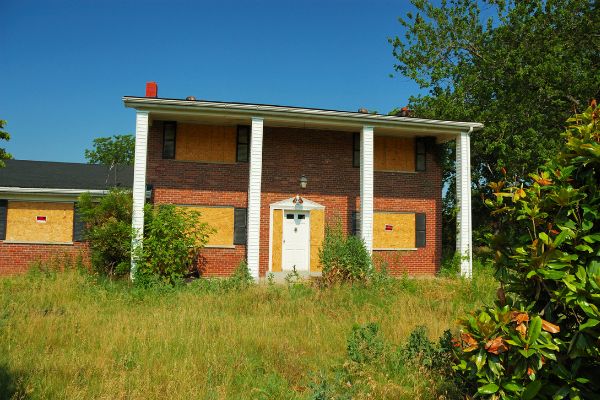‘Squatters rights’ is a phrase that can strike fear into a property owner’s or landlord’s heart, conjuring up scenarios in which someone effectively steals your property. However obtaining squatters’ rights is a long and complex process, and you do have the right to remove squatters from a property you own, provided certain criteria are fulfilled. Here’s our guide to squatters’ rights UK and what landlords and property owners need to know.
Table of Contents
Toggle
A squatter is someone who enters a property without the permission of the owner or landlord with the intention of living there. Some people squat in properties due to homelessness, poverty, recreational reasons, or as part of a protest. In 2022, a group of protesters squatted in a London property that was owned by Vladimir Putin ally Oleg Deripaska to protest the war in Ukraine.
Someone who has, in good faith, entered a property as a tenant or licensee may be considered a squatter, but cannot be arrested. This could be someone who has been conned by a fraudulent landlord into paying them rent or a deposit. Tenants who stop paying their rent are also not considered to be squatters.

Squatting in residential properties is a criminal offence under the Legal Aid, Sentencing and Punishment of Offenders Act 2012 which can incur a fine or time in prison, although squatting in non-residential properties may not incur criminal charges. Further criminal offences under the Criminal Damage Act 1971 have been committed when someone damages the property, either to gain entry or while they are occupying it.

Gov.uk says that someone entering a non-residential property is “not usually a crime”, however, if they commit other crimes while there, the police can take action. This could include damaging the property, not leaving when a court order is obtained telling them to do so, stealing from the property, using utilities like gas or electricity without permission, fly-tipping or leaving rubbish there, or failing to obey a noise abatement notice.

Squatters’ rights might sound like anyone can just stroll into a property owned by someone else, claim squatter’s rights, and start living there scot-free. But this is not the case. Someone would have to occupy a property for at least 10 years without being opposed by the owner to claim adverse possession. Adverse possession is the occupation of land or property by a person who is not legally entitled to it.
A long-term squatter may apply to become the registered owner of a property without the owner’s permission if:
Once they have applied for adverse possession with the HM Land Registry Citizen Centre, the property owner will be contacted. They then have 65 days to object to the application, which will usually result in an automatic rejection.
So as you can see, it takes a long time indeed to legitimately make a claim for adverse possession of a property, or claim squatter’s rights. The kind of property that is vulnerable to such occurrences is usually a holiday property or somewhere that the owner or landlord does not visit in person, nor keep any kind of surveillance or upkeep on. It could be that the owner has passed away or moved without supplying any new contact information which causes them to miss the notification from the HM Land Registry.

Most property owners will not have this problem, so try not to worry unduly about it. You can make your property squatter-resistant by taking the following steps:

The first thing to do if you believe you have squatters on your property is to file a police report. You will likely have to prove that you are the owner or landlord of the property so make sure you bring all paperwork with you. You can then apply for an IPO, or Interim Possession Order with the local county court, which requires squatters to leave the premises within 24 hours and stay away from the property for 12 months. After this time, if they still have not left, they will have committed a criminal offence and could be arrested, fined, or even sent to prison.
An IPO can only be filed within 28 days or less since the property has been squatted, so don’t delay. After 28 days you would need to apply for a Claim For Possession, which can take longer. Do not attempt to remove the squatters yourself or by force, as this could mean you have committed a crime. You could also be in danger if you do so, so get the police involved and don’t take any unnecessary risks.
If the HM Land Registry contacts you to inform you that squatters have applied for legal ownership of a property you own, then you must reply within 65 days. Contact a solicitor or other legal counsel in the first instance – they can advise you on the specifics of your situation.
You must then register your objection to the application, and take action to reclaim the property using the methods described above. HM Land Registry may even give you the option to sell the property to the squatters, hopefully reaching a resolution that leaves all parties satisfied. If you take no action to remove the squatters and ignore their application, it could be possible for you to lose that property, so this is nothing to sleep on.
Do you want to invest in your future by getting on the property investment train? Join us for one of our FREE property training events to get advice from our team of experts – click here.
You May Also Be Interested In...

A Guide to Selling Your Buy-To-Let Property
Thinking of selling your buy-to-let? Learn how to time the market, manage tax and maximise

Planning Permission Loopholes You Should Know About
Discover UK planning permission loopholes, permitted development rights and when you can extend, convert or
Featured Property Investment Events & Courses
The Property Deal Packaging Summit
The Property Millionaire Bootcamp
The Serviced Accommodation Bootcamp
Assets For Life LTD is a company incorporated in England and Wales with registered number 09935286 and registered offices at Assets for Life Ltd, Suite 105, Waterhouse Business Centre, 2 Cromar Way, Chelmsford, Essex, England, CM1 2QE, United Kingdom.
Assets For Life LTD is registered with the Information Commissioner’s Office, with registration number ZA280607
COPYRIGHT © 2024 ASSETS FOR LIFE, ALL RIGHTS RESERVED. WEBSITE BY AMPLIFY MARKETING